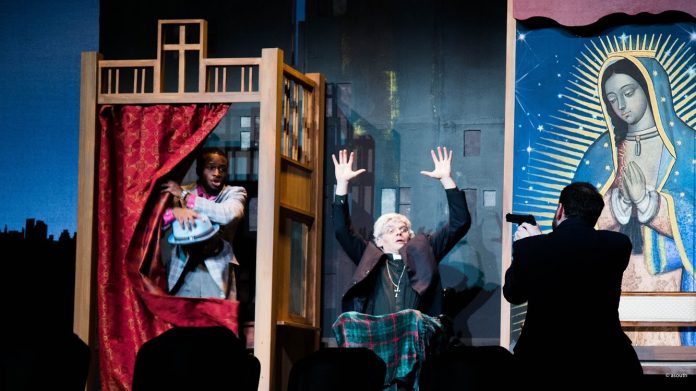Last Thursday, the College of William and Mary theatre department opened a new production of Stephen Adly Guigis’s “Our Lady of 121st Street,” a play that blends comedy and tragedy to tell a poignant story about family, loss and community. The play follows the events leading up to the funeral of Sister Rose, a Harlem nun whose corpse has been stolen. As a group of Sister Rose’s former students return to their old neighborhood, their interactions after years of separation are simultaneously hilarious and tragic.
Naturally, the subject matter of the play allows for the expression of several complex themes; however, none stood out more noticeably than the idea of finding your family. Modern theatre, film and literature have beaten the concept of the “family that you choose” into our collective minds, but ‘Our Lady’ manages to give the concept a certain novelty and nuance.
“In this story, it is an alcoholic, abused, fractured, broken woman who even in her imperfection was a mother,” director and professor of theatre Francis Tanglao Aguas said. “It’s about the importance of family and the importance of mothers.”
Sister Rose wants to unite an incredibly disparate group of people into one family, albeit a relatively dysfunctional one. Unlike most stories that follow similar themes, “Our Lady of 121st Street” avoids the saccharine tropes of them entirely, instead focusing on the reality of the way these found families behave. The family that Sister Rose built has crises like any other, and the play finds beauty in the imperfections of that family.
The ideas of family do not end with the performance, though. The culture of the cast was clearly one of support and friendship. During preparation for the show, no member of the cast or crew left rehearsal alone. The goal of making the cast into a family clearly succeeded.
“We’re basically a family at this point,” Jessica Ellison ’20, who plays Inez, said.
One of the uniting factors of the cast was their respect of the leadership of Aguas, also a professor of Asian Pacific Islander American studies at the College.
“I’ve really been able to grow as an actor and a person under [Aguas],” Francis Edemobi ’19 said.
Audiences reacted extremely positively to the show. With hearty laughs during comedic moments and sincere sobs during tragic ones, they were extraordinarily engaged with the play.
“It was perfect,” audience member Sam Mukhtari ’19 said.
“Extremely positive reactions” was the theme of the night. Gil Osofsky ’20, who saw the show on its opening night, expressed how much he liked it.
“It was a fantastic performance by everyone,” Osofsky said. “A great blend of humor and grief and lot of realism in the dialogue. It was very impressive.”
The blending of comedy and tragedy is one of ‘Our Lady’s’ greatest strengths. The audience’s laughter never felt out of place despite its juxtaposition with heavy drama. While somewhat uncommon, the “tragicomedy” genre perfectly suits the variety of realism that ‘Our Lady’ depicts.
“In life, comedy and drama are not so different,” Michael Alvarez ’20, who plays Balthazar, said. “It’s feeding off of drama into comedy and comedy into drama.”
Because of this portrayal of real life, the sudden tonal shifts are clear, but never jarring. ‘Our Lady’ truly succeeds in expressing that life is not monotone. The good goes hand-in-hand with the bad, and laughter goes hand-in-hand with tragedy.
This same sentiment is also held by director Aguas.
“People who lead difficult lives can’t look at their lives as difficult,” Aguas said. “In the United States, for people of color in marginalized communities and low-income neighborhoods, this is life. You have to make the most of it, and that’s what these characters do.”
Aguas’s personal experiences allowed him a particular insight into this idea of tone in the lives of underprivileged.
“As somebody who grew up in a developing country under dictatorship and military rule in the Philippines, under colonialism, under colonization by Japan and the United States, Filipinos, for instance, we don’t go around crying every day, woe is us, this is the life we lead,” Aguas said.
All of these factors allowed for a play rooted in a somewhat absurd scenario to feel completely grounded in reality.
Diversity is an extremely important part of “Our Lady of 121st Street.” With a more diverse cast than most other productions by the College this season, ‘Our Lady’ has succeeded in furthering the cause of increasing diversity in the College’s theatre productions, featuring characters who represent a vast spectrum of ages, races, sexual orientations and socioeconomic backgrounds.
“This is a story that needs to be told,” Alvarez said. “Especially here in Williamsburg, where we don’t get a lot of opportunities to tell stories about these types of people.”
Reporting contributed by Grace Olsen.
Editor’s Note: The Flat Hat would like to clarify that Anthony Madalone ’21 is an Opinions Associate Editor for the paper. His involvement with “Our Lady of 121st Street” is not on behalf of the paper’s interests.

